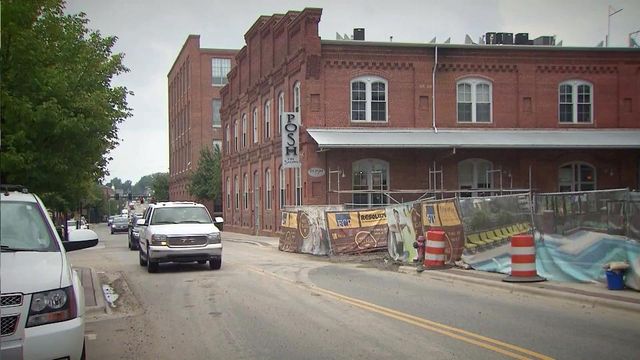Film, historic district programs to scale back
Tax credit programs used to land film productions and rehab mill buildings will be turned into grant programs as a result of legislative action this summer.
Posted — UpdatedSimilarly, a tax credit program that is currently used to help reuse old mill and agricultural warehouse buildings will expire at the end of this year. No state program will replace that credit, but senators have passed a bill that would allow cities and counties to make grants for the rehabilitation of those older buildings.
Both programs were allowed to sunset as part of the 2013 tax reform effort, which sought to lower tax rates and close loopholes. Those changes, proponents argue, will help spur the economy. But those involved in the two industries say the grant programs won't go far enough to replace the tax credits and will hurt economic development.
Film industry may roll credits
The film industry credit allowed movie, television and commercial producers to recoup 25 percent of their qualified costs in the state. In recent years, those productions have drawn down between $40 million and $80 million.
Advocates for the industry say the program has been responsible for helping land big film projects, such as "Iron Man 3," as well as long-term television productions such as "Sleepy Hollow" and "Under the Dome."
That credit will expire at the end of the year. Lawmakers are in the process of passing a budget that would replace the credits with a $10 million grant program, which will be administered by the Department of Commerce.
The Motion Picture Association of America and "its members have concluded that the $10 million grant program is significantly underfunded to support the level of jobs, spending and local investment in North Carolina,” said Vans Stevenson, MPAA’s senior vice president for government affairs.
Responding to the possible loss of 4,200 jobs connected to the industry, House lawmakers voted to extend the film credit program by amending a Revenue Laws Technical Corrections bill.
"I honestly feel like this is a murder trial, and I'm representing the film industry and I'm fighting against the death penalty," Rep. Ted Davis, R-New Hanover, said on the House floor arguing for the bill.
The Wilmington area that Davis represents is known for its heavy investment in film jobs, but he and other supporters say there are people all over the state who earn a living from an industry that is now subject to being lured away by other states with richer credits.
While the measure got a tentative nod Thursday and is likely to pass the chamber at some point Friday, senators have left town for the year. Without a senate vote, there is no way for the film credit extension to pass.
Although it's always possible for lawmakers to return to session, the adjournment resolution passed by the Senate that is pending in the House would not allow for a Senate hearing of the Revenue Laws Technical Corrections bill, despite calling for a two-day session on Aug. 14-15 and another session in November. That means, without an unexpected change, the film credit extension effort is dead for the year.
Buildings may sit unused
Gov. Pat McCrory and his cultural resources secretary, Susan Kluttz, had pushed lawmakers to renew a tax credit for rehabilitating historic mill and warehouse properties, which also expires at the end of this year. The credit has also been championed by city and county officials, who say the credits help them spark new life into small communities and urban downtown areas.
"In both rural and urban North Carolina, historic buildings sit empty and abandoned in our downtowns," said Julie White, executive director of the North Carolina Metropolitan Mayors Coalition, a group of the state's biggest cities.
The redevelopment credits, White said, help developers take on expensive rehabilitation projects that spark redevelopment through much of the state.
Durham Mayor Bill Bell said the credits helped developers remake many abandoned tobacco warehouses in the Bull City in recent years.
Capitol Broadcasting Company, the owner of WRAL-TV, used historic tax credits to develop the American Tobacco Campus in downtown Durham.
"Those buildings have come alive now. Without for the tax credit, I doubt that would have happened," Bell said. "For me, I see very little downside to having tax credits and a whole lot of downside if you take them away."
Advocates for the credit say it has been used in 90 counties across the state. Opponents said the redevelopment credits undercut last year's tax reform effort by creating loopholes in the tax code.
McCrory said he was disappointed that lawmakers had let the credits expire and would push the 2015 legislature to resurrect them. He called the local grant option "not enough," said that the credits did not run counter to last year's tax reform efforts.
"I want to participate in rebuilding the living rooms of many of these small rural towns," McCrory said.
Related Topics
• Credits
Copyright 2024 by Capitol Broadcasting Company. All rights reserved. This material may not be published, broadcast, rewritten or redistributed.






